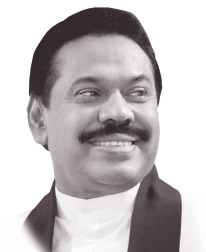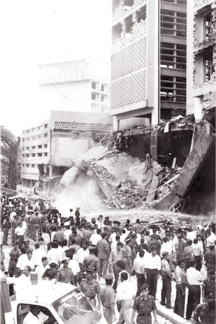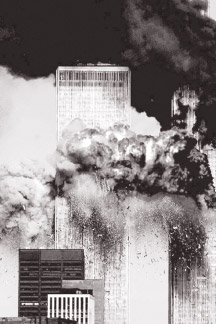Never let divisions prevent us from reaching our true potential
Interview with President Mahinda Rajapaksa
by Veronique Queffelec
 Veronique Queffelec: You are the only country in the world which
defeated terrorism with a conventional Army. Do you think the world
awoke in this respect? Veronique Queffelec: You are the only country in the world which
defeated terrorism with a conventional Army. Do you think the world
awoke in this respect?
Mahinda Rajapaksa: Itís true that we are the only country in the
world which defeated terrorism after 35 years of suicide attacks, bomb
cars, assassinations, etc.... Even our Central Bank blew up. We suffered
a lot. We tried to negotiate with the Liberation Tigers of Tamil Eelam
(LTTE), to start a dialogue with them, but they didnít want to listen.
We had to do what we did. The West should understand that. Some
understand, others donít. We faced what the West is now confronted with.
Today, many nations ask our advice to defeat terrorists in a decisive
way, affecting as few civilians as possible. Yes, I do think the world
is awake.
VQ: The West seems united when itís a matter of defeating Al
Qaeda and the Taliban. Why did they hesitate acknowledging your victory
over the most dangerous terrorist organisation in the world?
MR: Thatís the saddest thing of all. Because they only
understood the importance of terrorism after 9/11/2001. When they are
attacked, they react. But when a developing country as ours is attacked,
theyíre just not interested. Thereís a double standard applied in these
countries, which I still canít understand. This mentality prevented them
from realizing our sad situation.

Central Bank bombing in Colombo(L)
and WTC bombing in New York: How
are they diferrent?
 |
VQ: You mean that today, whatever group or person eliminating
Bin Laden or Al Qaeda, would be celebrated in the whole world as a hero
by the same countries which gave the LTTE their moral support?
MR: Just before the end of the war, a few hours before the
LTTE leaders were killed in battle, some of these nations showed their
hostility towards us because we were refusing to play the role of the
weak State when it was about defending our national interests. If we had
been the associates of the powerful countries, then they would have
accepted it. I canít see any difference between Al Qaeda and the LTTE.
VQ: Is there a simple and powerful message you would like to
send to the West and particularly Europe about the cancellation of the
speech you were supposed to deliver in Oxford Union?
MR: We thought the United Kingdom was the cradle of democracy
and freedom of speech. We thought they believe in the spirit of your
philosopher Voltaire. ďI disagree with what youíre saying, but I shall
fight until death for you to have the right to express itĒ I was invited
and my speech was cancelled at the very last minute because of the
protests of LTTE defenders.
VQ: What were they afraid of?
MR: I would have told the truth on what happened, on the way I
defeated the terrorists. About the reconciliation, about our development
program in the North, on the way the LTTE destroyed during the last
thirty years everything that ever thrived, the railways, the roads and
the hospitals. We spent over $ 2 billion in reconstruction. Many
terrorist groups that ran away left for the United Kingdom, or Canada.
They want visas now and the status of political refugees. This is a good
new business for terrorists, they collect money on foreign territories.
Unfortunately, for electoral reasons, some Western governments donít
want to consider the activities of the LTTE.
VQ: Why donít you invite in your country some of the former
members of the LTTE to join your government, asking them to deliver a
message?
MR: We already have some of them. The former No. 2 of the LTTE
chief for example. Our Chief Minister of the Eastern Province is a
former child-soldier. He was elected by the population as a member of a
Provincial Council. But it seems that the West doesnít want to listen to
them.
VQ: The French media published information on arrests of LTTE
members that took place in France, who would have extorted money, like a
mafia group. Did you read anything about this?
MR: Yes, I did. Even today they are still acting like that.
Some European countries took measures, but others ignore these
wrongdoings because these mafia groups have lobbies. For example,
Wikileaks showed that in the UK, David Miliband was spending almost 60%
of his time on issues related to the LTTE! It has to be for the votes.
But there is one clear thing: these politicians who helped the LTTE in
other countries all lost their seat in elections.
VQ: How do you assess the nature of your relations with
France...... Good? Very good?
MR: Very good, even if sometimes they misunderstand our
position. As far as weíre concerned, weíve always tried to get closer to
this country. Theyíve made a lot of business here. Just consider
SriLankan Airlines. Our whole fleet is composed of Airbuses.
VQ: Are you looking for help to get another loan from the IMF?
MR: For the time being we donít need it. We have very good
reserves. When we obtained a loan on the previous bracket, it was not of
the same nature than the one granted to Greece or Spain. We do not know
this type of crisis. We managed to reach and maintain a growth at 6.5%
since my election in 2005 even on a year of war. Before that the figure
was a negative one. In the years to come, my objective is to reach an 8%
growth.
VQ: What are you expecting from France?
MR: The French have to acknowledge the threat of the LTTE, not
only in Sri Lanka, but also in other countries, from dormant cells to
agents of propaganda.
Hard-line terrorists slowly managed to go to Europe and Canada. These
people are criminals. Do not forget they invented explosive belts and
created child-soldiers. They perfectly can get together with elements in
the West who are trying to destroy it. Exporting terror is a very good
business. The exportation of terrorism technology is about to reach this
country, and itís a warning I want to send to France.
VQ: Some European countries do not see the strategic
importance of Sri Lanka. How do you perceive its growing importance on a
geopolitical point of view?
MR: Sri Lanka and its territorial waters are a place where all
sea routes of the world converge. You may judge yourself of its
strategic importance. The new port of Hambantota (Magampura) in the
South shall emerge as one of the biggest activity centres of the kind in
the region. Many heads of States sent emissaries and wish now to visit
themselves.
VQ: Some believe you are too close to China. They already have
a lot of influence in the North and are looking to extend their presence
in the South as well.
MR: Some also think we are very close with India! In fact this
idea of getting closer to China comes from the propaganda led by the
pro-LTTE. When the Chinese came, we obtained commercial loans from them
and we bought their arms openly. I had to buy some. We bought some from
China, India, Ukraine, Russia, Israel and even Hungary. Itís no secret.
VQ: Many countries in Europe do not see you had to free
yourself from terror and just question your respect of human rights. How
do you react to this?
MR: As a lawyer I was myself a defender of human rights, so I
would never let anyone in my country violate these human rights. Sri
Lanka believes in the values of these rights and in the battle against
the LTTE, that was what it was about, to restore human rights in the
North. Iíve established with authority that our troops should be under
strict orders to avoid causing damage among the civil population. We
have investigated on crimes during the fights, each time we noted
abuses, weíve punished the culprits and even imprisoned them.
VQ: And about the declarations done in the media and
accusations uttered by human rights groups?
MR: Most of these associations are manipulated by the
opposition propaganda, by people who want to win money this way. These
so-called activists and defenders of the Human Rights and many NGOs
getting benefits, thanks to that. If they were writing that thereís no
incident to report, they would not make money. To make money they have
to say that there is a violation of human rights. Then they go to the
West and to their Embassies. Some of these Embassies even refused to
grant visas to my Ministers for official economic business, while they
gave them to terrorists or suspected terrorists. All they need to say is
that my Government is persecuting them and claim refugee status.
VQ: You said you imposed sanctions against those who committed
abuses?
MR: Why donít people talk about the violation of human rights
in Iraq, Afghanistan or Pakistan? Our fight against the LTTE comprised
direct confrontations on the ground. We did not use time bomb or carpet
bombings. Itís the very opposite. On one of the complaints we received,
I kept a whole unit of officers suspected of crimes in detention for one
year and a half. According to our Law, the government has to prove they
are guilty. Without proof, we canít start prosecuting them. There was no
proof. In the end, a Tamil politician (who was not part of the
government) asked me to release them, which I did.
VQ: But why arenít these stories conveyed by the media?
MR: Twenty years ago, when the Muslims were chased out from
the North up to the frontline, by the LTTE, nobody talked about it. When
the Sinhalese were chased away, nobody talked about it. It was yet
ethnic cleansing. The most serious violation of human rights took place
when, at the end of the humanitarian operation, the LTTE kept 300,000
Tamils hostage as human shields and shot those who tried to run away. My
government aided these hostages and progressively rehabilitated them.
And itís for them that we are rebuilding the North.
VQ: Economically speaking, today Sri Lanka is seen as an ideal
destination for investment in the field of tourism but also for direct
investment from abroad. What did change?
MR: In the past, people were afraid to come here because the
country was considered as dangerous. Now it is safe. The profits we
allow make of our country an ideal place to invest. Weíve taken several
arrangements to facilitate the freedom of commercial exchanges. Our
workforce is cheap and qualified. And most of the means implemented to
protect invested capitals are guaranteed by the Constitution. The IMF
recently ranked Sri Lanka as an average-revenue country. The New York
Times ranked Sri Lanka as the best tourist destination in 2010, among 31
others. National Geographic ranked us as the second best island to visit
this year. The number of tourists who visit us doubled this year.
VQ: In which specific fields would you encourage investment
from Europe?
MR: We have to have Europeans invest in everything they want
to produce here: clothes, textile, hotels and services. The Germans and
the French have great projects.
VQ: What are your priorities?
MR: We want to develop the air and sea sectors, knowledge,
trade, and activity centres. We are making very good progress. Since our
independence until my election in 2005 (that is 58 years), the income
per head reached $ 1000 a year. These last five years of my mandate we
doubled it to $ 2000. I want to make it double again in the five years
to come to reach $ 4000 per head. You see then, that even fighting one
of the most brutal terrorist organizations of the world, it took me only
5 years to reach the first step. For the next one, Europe is welcome to
invest in our growth.
VQ: The United States seems to get closer to Sri Lanka. Do you
think countries like France have been left behind?
MR: But why should we leave any country behind? With the
general use of English, a literacy rate of almost 90%, a rate of
information and communication technologies established at 30% and highly
competitive salaries. Sri Lanka is converting its post-war economy of a
tea and textile producing island, into an economic centre of high-level
subcontracting.
Thousands of Sri Lankans are already working in sectors of
subcontracting, as in IT and the development of computer software.
Almost 50,000 persons in Sri Lanka are employed in a form or another of
subcontracting. This figure increases 20% per year. What is exciting and
brand new for us in this field is accountancy. We are expecting fallouts
of this specialization in subcontracting, with revenues that shall
triple to reach a billion dollars by 2015.
VQ: Youíve met delegations from Europe and elsewhere. Can you
share with us the content of your discussions regarding economy and
politics?
MR: They are ready to invest and we invited them to take part
in our economic development. The international community has to
acknowledge that we defeated terrorism and help us get developed after
thirty years of conflict. They shall not try to intervene and change
governments elected legitimately and legally. The people have to change
that, not foreign countries.
VQ: There is not enough information available regarding the
trade opportunities your country offers, especially in Europe. What can
you suggest to become more efficient in your communication?
MR: We need to spread information better. We have to go more
on the offensive in the search for media coverage, to counter negative
prejudice. We are currently examining several possibilities.
VQ: What kind of opportunities are there for SMEs?
MR: New companies, like one department of the publisher
Pearson & MphasiS, a technology company belonging partly to
Hewlett-Packard, just announced they were going to hire 2000 people here
within the three years to come. In the tourist sector, Shangri-La is to
be the first luxury hotels group to settle in the country, because our
objective is to increase the number of hotel rooms from 15,000 to 50,000
by 2016. Thereís a significant capacity for SMEs, that is why we
established new policies to facilitate investment coming from abroad.
VQ: How can the budget aid you are offering attract European
companies and in which particular field?
MR: We encourage foreign investors with a quite low tax rate
for companies. We are going to implement Special Economic Areas in
Trincomalee, Hambantota, Colombo, among many others. We are among the
few countries in the world to authorize the repatriation of 100% of
foreign investments.
VQ: Can you give us clear examples of opportunities for SMEs?
MR: In jewellery, clothes, specialised clothes, embroidery,
excellent quality hand-stitched lace, agriculture, computing.
VQ: And for the use of sea resources?
MR: The sea is the second most important economic zone for Sri
Lanka. It is our main source of titanium, petroleum, together with its
wealth for the fishing industry and in any activities of the sea world.
VQ: France has one of the biggest research institutes in the
field of sea resources. Would you be ready to invite them to cooperate
and start new relations?
MR: If you could convince them to come, they could open an
institute here. We can attract foreign students to Sri Lanka. We would
be delighted to create new campuses and welcome universities like La
Sorbonne. We already have 13 universities for higher education. But only
2% of the students have the capacity to attend these universities, in
spite of our literacy rate of 90%. Almost 3.8% of our GDP is dedicated
to education. We give education, books, clothes, lunches to our school
pupils for free and there is no enrolment fees in our universities.
VQ: What kind of mediating role could Sri Lanka play in
negotiations with sensitive countries like Iran, knowing that the
government leaders of these countries trust you?
MR: If Iím asked to play a part in the re-establishment of
relations between countries, then I believe it is my duty to help them
in the interest of harmony, human rights and world peace.
VQ: According to you, what is your greatest success since the
end of the conflict ? What is your vision of the future?
MR: To see this country develop in a context of peace and
conciliation. Without peace there is no development, and without
development there is no peace possible. This country belongs to us all.
I shall pursue my efforts to unite all the people of our country,
whether they live here or somewhere else. If weíre all united we have a
great future. If we leave divisions dominate us, we shall never reach
our true potential. We already have thirty years of conflicts and
divisions behind us. We now have to ensure sustainable peace and harmony
for all Sri Lankans.
This interview was published in Franceís Entreprendre |

